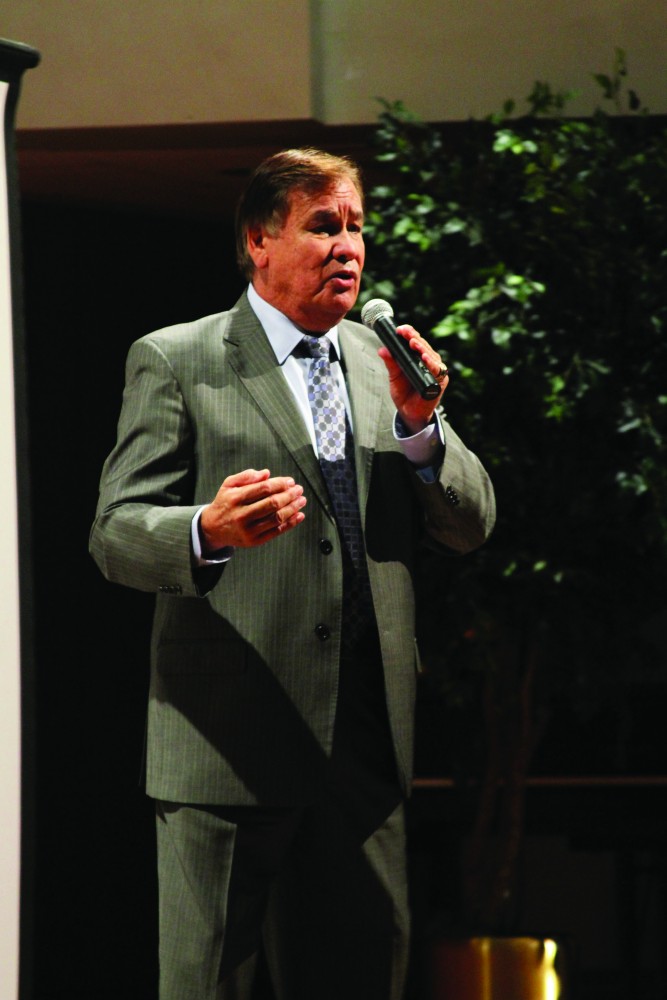Professionals of Color Series brings Olympic gold medalist

GVL / Emma Moulton Speaker Billy Mills
Nov 18, 2012
On Nov. 12, Billy Mills, the first and only American to ever win a gold medal in the 10,000 meter, or 6.2 mile, run at the Olympics, took the full-house audience at the Cook Dewitt Center on a powerful journey during his two hour presentation.
Growing up on the Pine ridge Reservation in South Dakota as a Lakota Sioux Native American, Mills was continuously faced with the ignorance of racism.
“We live in strange times. The world is rapidly changing … I call the greatest challenge we face ‘perceptions,’” Mills said, going on to explain how people’s perceptions of him, and his ethnicity, didn’t change despite his 1964 Olympic win.
As a teen, Mills ventured out of the reservation with a friend to find work to save money over the summer. They hitchhiked and ended up at a farm where a farmer allowed them to sleep in the wrecked cars at the end of his property; Mills chose a Hudson Hornet.
Shortly after, with a scholarship in tow, Mills attended the University of Kansas. There, he was not allowed to room with his two best friends, who joined a fraternity. When Mills tried to join he was denied and told it was because he’s Indian and therefore had nothing to contribute. Throughout adolescence Mills was constantly told, not usually asked, to get out of photos. Even as an adult in the Olympics he was told to get out of pictures because he was a minority until another Canadian athlete refused to be in the picture if Mills wasn’t in it as well.
Many years after Billy Mills’ Olympic win, he was out to dinner with his wife, Patricia, and daughter, Billie, when a professional basketball team walked through the doors. After talking with fans, Mills’ win was brought up as “that Indian who won the gold medal” and someone asked what had happened to him. One of the players spoke up and stated that Mills was “an alcoholic, drug addicted, and gave up just like the rest of them (Indians).”
Mills’ daughter continuously whispered “daddy, say something to them.”
The players’ words brought Mills back to a moment of insecurity, a moment of self-hatred, of sadness. In this moment, he’d given up on life – his knees literally on the windowsill and his hand on the glass – he was ready to end it.
“I heard in my ears and underneath my skin ‘don’t … don’t,’ I thought it was my dad,” Mills said. He believes his father came to him and told him not to jump, not to commit suicide, but to pursue his dreams and aspirations instead. Mills immediately clambered down from the sill and wrote “10,000 meter gold medal” on a portion of paper.
Before Mills became an orphan at age 12, his father told him that he would someday have the wings of an eagle. He used this memory as inspiration not only to race in the 10,000 meter run in the 1964 Olympics, but to win. A diabetic, Mills realized shortly after beginning the race that he was running with low blood sugar, and it was tiring him.
“I took the lead and was looking for a place to quit. It’s easier to quit when you think you’re winning or when other people think you’re winning,” Mills said. The other competitors pushed him behind and Mills appeared to be too far back to be a threat to another’s victory. The other runners were boxing him in, his only thought was “I’ve got to go now.”
Mills looked to the side and caught a glimpse of an Eagle on a German competitor’s shirt, reminding him of his late father. He knew he’d never be this close again and needed not only to finish, but to win. Mills set a new Olympic record for the event with a winning time of 28:24.4. He later saw the German man and realized there was no eagle on his shirt.
The memories of his former pain and his father’s belief in him gave Mills the strength to speak up to the men in that restaurant.
“Are you talking about Billy Mills?” Mills asked the basketball players. “Alcohol has never touched his lips. He’s never done drugs by choice. He tries every day to comply by Native American traditions and virtues.”
His daughter then reminded him, “you always have strength to have wings of an eagle.”
Billy Mills closed his presentation by showing a 90-second video he dedicated to “warriors of education,” aka Grand Valley State students, showing struggles of other past winners of the Olympics who overcame destitutions to win the gold. “The way we learned of his hardships and his commitment to make no one else happy but himself really motivated me to respect others more,” said GVSU student Alex McNeal.
Now Mills does charity work, serves as the spokesperson for Running Strong for American Indian Youth, and speaks to those interested in hearing his story and how his life, like many others, is impacted by racism and the passion to meet goals.
[email protected]





















